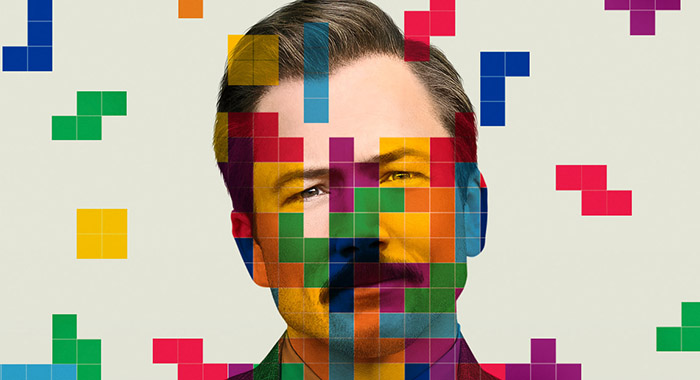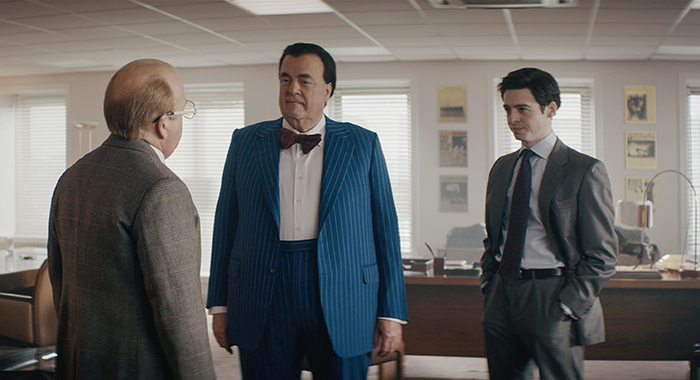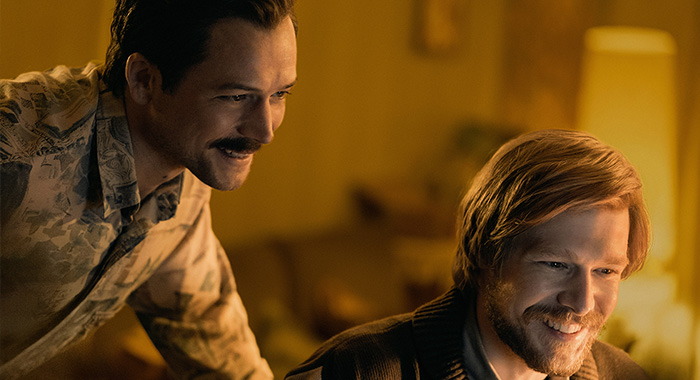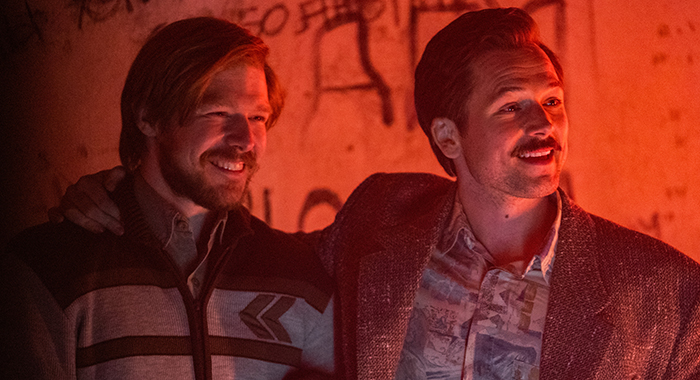Taron Egerton and Director Jon S. Baird on Tetris Fact Versus Fiction
"It's a story about friendship, and it's a story about one man doing something crazy," Egerton says. The film's star, Baird, and game producers Henk Rogers and Alexey Pajitnov discuss the Apple TV+ original.

(Photo by Apple)
The beauty of Tetris, the wildly addictive game that grew to prominence thanks to its partnership with Nintendo’s first Game Boy, is its simplicity: Match a series of falling shapes into lines to clear the board and win points.
However, getting Tetris to the mass market was anything but simple.
In the movie Tetris, director Jon S. Baird recreates the death-defying smart-talking that video game designer and entrepreneur Henk Rogers (portrayed by Taron Egerton) participated in to bring game creator Alexey Pajitnov’s (portrayed by Nikita Yefremov) vision out of communist Russia and into the rest of the world.
Families were threatened. Bankruptcy was at hand. And the KGB was everywhere. After a limited theatrical release, the film premieres March 31 on Apple TV+ (appropriately, as the streaming service also grew out of a company that was a big deal in the ’80s and ’90s computer age).
Despite the main foil in Tetris being government control and censorship, Egerton told Rotten Tomatoes that “I really don’t see it as a very political movie.”
“It’s a story about friendship and it’s a story about one man doing something crazy to get the rights to a game,” he continued. “It just so happens that that was in a place of political fractiousness at the time … [The film is] intended to be quite digestible, and, tonally, quite fun. If it had political aspirations, it would probably be a little more sober and a little less larger than life.”
Indeed, while the film depicts an (admittedly fictional) car chase through Moscow with a sneering KGB agent on their tail, the story is mostly about how Rogers earned Pajitnov’s trust — either through his sheer ignorance of how dangerous a situation they and their families were in or just his willingness to tell the truth.

(Photo by Apple)
The real Rogers said that it was “20 percent naivety and 80 percent determination” that made him so determined to acquire the rights to the game. In this pre-cell phone and Zoom era, he booked last-minute flights around the world and barged into offices to line up deals. Meanwhile, he had to deal with double-crossers like the eventually discredited media magnate Robert Maxwell (Roger Allam) and his spoiled and clueless son Kevin (Anthony Boyle) as well as their conduit, the also-shady Robert Stein (Toby Jones).
“When I heard that someone else was trying to sell Tetris … I went to overdrive,” Rogers said. “Two days later, I was on a plane to Moscow. Fighting to get those rights the competition got me.”
The gamble obviously paid off. There’s a scene in the film where Egerton’s Rogers says he’s been dreaming of the shapes falling. Nowadays, the real Rogers said he can’t help himself from taking pictures of Tetris-style pieces when he sees them implemented into advertising and architecture.

(Photo by Apple)
But, in watching Tetris now, it’s also a wonder that neither Rogers’ wife Akemi nor Pajitnov’s wife Nina — portrayed in the film by Ayane Nagabuchi and Ieva Andrejevaite, respectively — immediately divorced their spouses for putting their families in such precarious circumstances. Both men laugh awkwardly when asked this question. Pajitnov said he was nervous about showing the film to his family, but was relieved that they took it well and that “my wife even found it very accurate” in regard to the costumes and makeup.
The film also has the unique experience of depicting anxiety-riddled scenes made up of dialogue and not physical altercations.
Director Baird said that these scenes, usually set in depressing and ominous USSR-era government offices and apartments, only work because of the casting.
“When you get great actors, you could give them any line of dialogue and they can make it interesting or they can make it funny or they can make it suspenseful stuff,” he said. “We took a lot of time casting and got fabulous actors in there talking about the rights to an arcade game, which really should be very dull. But Noah Pink, who wrote the script, wrote a really great screenplay. But, ultimately, it comes down to their performance. And I think the thing that keeps the tension is the performance.”

(Photo by Apple)
All the legalese was a fun acting challenge for Egerton, who said that “as an actor, I always find dialogue to be the most stimulating thing.” He compared this to something like his work in the Kingsman movies, which are made by Tetris producer Matthew Vaughn and are known for stylistic fight sequences. In those instances, Egerton said, “the real creative side of it is in the guys building the stunt sequences and designing them and the second unit director who’s behind the monitors crafting this.”
“For me, in the harness or the guy getting slugged by a stuntman, I don’t find it particularly stimulating,” he said. “Whereas dialogue, I really enjoy. I find it very creative trying to justify the dialogue and make it feel fresh and like the first time someone said it.”
What he didn’t enjoy so much was depicting Rogers’ choice of facial accessorizing.
“I can’t grow a good mustache, so an entire team of dedicated professionals gave me one using Hollywood magic,” he laughed. “I really loved the way it looked and Hank wore one, so that’s why we elected to do it. But it was a nightmare. I don’t mind telling you: It. Was. A. Nightmare. It’s very unpleasant and uncomfortable to wear. Fine for a day. Probably fine for a couple of days. But over that 10 or 12 weeks? I was glad to get rid of that thing.”
Luckily, the fake mustache was a straight line and could, therefore, easily disappear.





